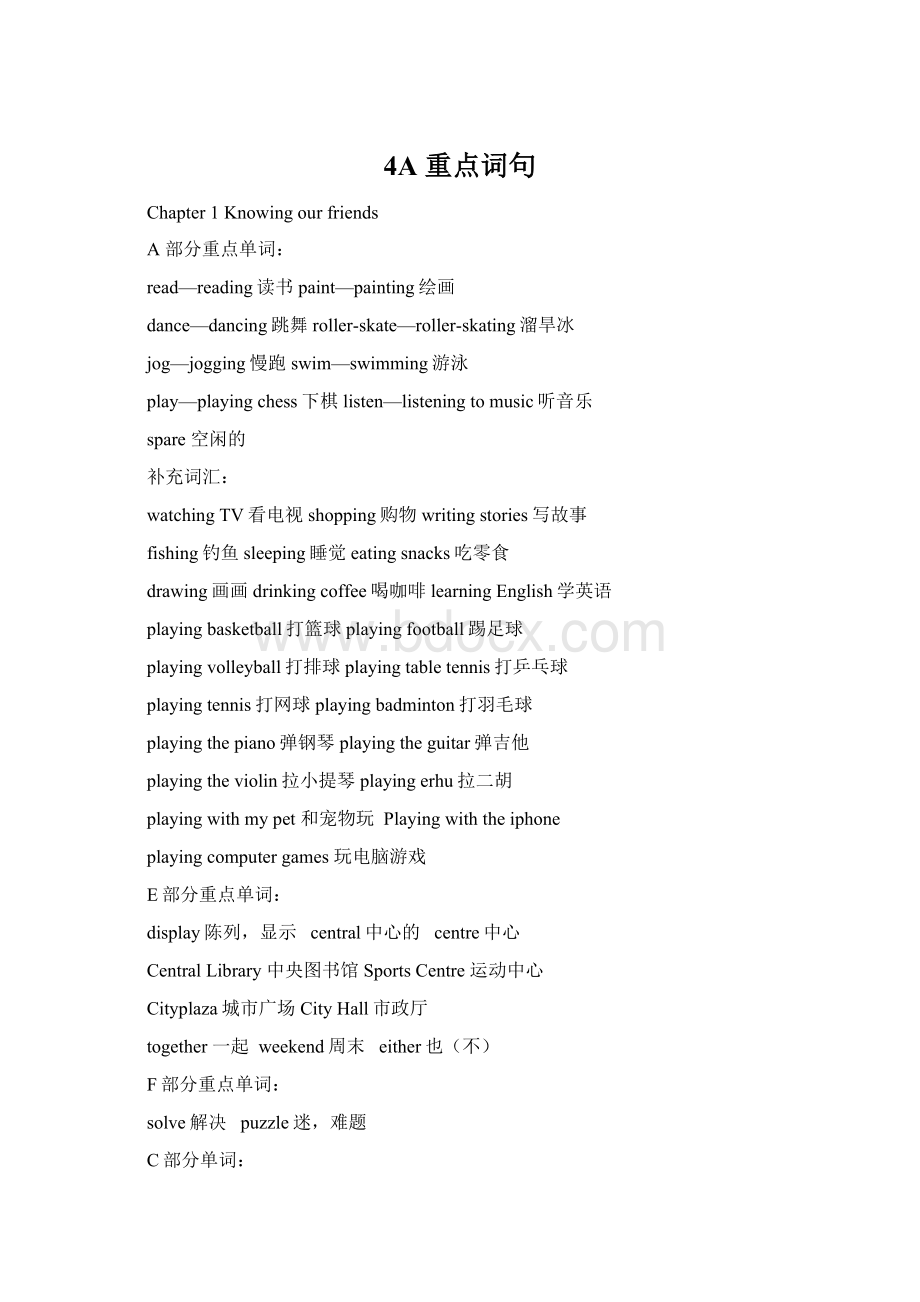 4A重点词句Word下载.docx
4A重点词句Word下载.docx
- 文档编号:19867388
- 上传时间:2023-01-11
- 格式:DOCX
- 页数:17
- 大小:27.78KB
4A重点词句Word下载.docx
《4A重点词句Word下载.docx》由会员分享,可在线阅读,更多相关《4A重点词句Word下载.docx(17页珍藏版)》请在冰豆网上搜索。

reply--replied回答leave--left离开think—thought想,认为
finger手指note笔记,音符
A部分重点句型:
1.Whatdoyoulikedoinginyoursparetime?
你空闲的时候喜欢做什么?
2.Whatdoyoulikedoingwhenyouarefree?
当你有空的时候喜欢做什么?
3.IIkeswimming,readingandlisteningtomusic.
我喜欢游泳,读书和听音乐。
4.Ilikeroller-skating,paintingandreading.我喜欢滑冰,绘画和读书。
E部分重点句型:
1.Let’sgototheCentralLibraryattheweekend.
周末我们一起去中央图书馆吧。
2.Ilikereadingtoo.我也喜欢读书。
3.Idon’tlikeplayingtabletenniseither.我也不喜欢打乒乓球。
F部分重点句型:
1.Maylikessinginganddancing.
2.Wendydoesnotlikereadingorsinging.
3.Whatcanthetwogirlsdotogether?
那两个女孩能一起做什么?
C部分句型:
1.RonandthefamilyhelperRosawerewalkinghomefromschooloneday.有一天,Ron和家庭保姆正走在从学校回家的路上。
2.CanIplaywiththem?
我能和他们一起玩吗?
3.Whydon’twegototheplayground?
我们为什么不去操场上呢?
4.Idon’tlikeplayingontheslideeither.我也不喜欢在滑滑梯上玩。
5.WhenRongothome,hewantedtoplaywithhisbrotherJohn.
Ron回家,他想和他的哥哥John一起玩。
6.Iamdrawingatrainformyhomework.我在做家庭作业,正在画火车呢。
7.AbitlaterJohnsaid,”I’mgoingtowalkthedog.
过了一会儿,John说:
”我要去遛狗了。
”
8.Rondrewalongertrainonthetable.Ron在桌上画了一列更长的火车。
9.Icanplaytheblacknotes.Youcanplaythewhitenotes.
我按黑色的键,你按白色的键。
朗文4AChapter2
Moreaboutourfriends更多关于我们的朋友的事情
A部分重点单词KeyWords
lookafteryourpets照看你的宠物gotobedearly早睡
tidyyourroom整理你的房间eatout出去吃饭
getuplate晚起surftheNet上网
ever曾经always总是everyday每天
usually通常,经常5or6times5或6次often常常,时常
sometimes有时,间或once一次twice两次never从不
E部分重点单词
Mondays星期一Tuesdays星期二Wednesdays星期三
Thursdays星期四Fridays星期五Saturdays星期六
Sundays星期日
bestfriend最好的朋友playmusic奏乐,弹奏音乐
playalotofmusic弹奏很多乐器playtherecorder吹笛子
playtheviolin拉小提琴playthepiano弹钢琴
playsport进行体育运动playalotofsport进行多种运动
playtabletennis打乒乓球playfootball踢足球playbasketball打篮球
E部分补充词汇:
Playthedrums打鼓playtheguitar弹吉他
Playthezither弹古筝playtheaccordion拉
Playtheflute吹笛子playthecucurbit吹葫芦丝
PlaytheErhu拉二胡playthesaxophone吹萨克斯
F部分重点单词
homecooking在家做饭seldom很少agoodcook一位好厨师
miss/missesafootballmatch错过一场足球比赛match/matches比赛
watch/watchesfootballmatches看足球比赛group小组
bored无聊的;
无趣的have/has有afterschool放学以后
G部分单词
swimmer游泳者goldenrule黄金法则reader读者
story/stories故事comic/comics漫画;
连环画
magazine/magazines杂志takealook看看make/makescakes做蛋糕
especially特别bake/bakes烤,烘焙
C部分单词
polite有礼貌的friendly友好的spill/spilt洒出,溢出
angry生气的wish希望more更加
think/thought想,认为invite邀请talk/talkedto和…说话else其它,另外take/taking/tookphotos照相
wouldliketo…想去…show…around带…参观
cookbook/cookbooks食谱;
烹饪书ready准备好了
enjoy/enjoyed享受shout喊叫camera相机
1.-Doyouevertidyyourroom?
-你曾经整理你的房间吗?
-Yes,Iusuallytidymyroom.-是的,我经常整理我的房间。
2.-DoyoueversurftheNet?
-你曾经上网吗?
-No,IneversurftheNet.-不,我从不上网。
1.–Doesshe/heeverplaytherecorder?
-她/他曾经吹笛子吗?
-Yes,she/heoftenplaystherecorder.-是的,她时常吹笛子。
2.Shesometimesplaysthepianotoo.她有时也弹钢琴。
3.Thisismybestfriend,Jenny.这是我最好的朋友,Jenny。
4.Shelikesplayingmusic.她喜欢弹奏乐器。
5.Sheplaysalotofmusiceveryweek.每周她弹奏很多乐器。
6.Helikesplayingsport.他喜欢进行体育运动。
7.Heplaysalotofsporteveryweek.每周他进行多种运动。
1.Peterlikeshomecooking.Peter喜欢在家里做饭。
2.Heseldomeatsout.他很少在外面吃饭。
3.Henevermissesafootballmatch.他从来没有错过任何一场比赛。
4.Sheusuallyplaysthepianoafterschool.她通常放学以后弹钢琴。
5.MyfriendLuluisneverbored.我的朋友璐璐从来不感觉到无聊。
1.PeterandBillgotothesamepaintingclass.
Peter和Bill去上同一个绘画班。
2.Billisalwayspoliteandfriendly.Bill总是非常有礼貌,对人很友好。
3.Oneday,agirlinthepaintingclassspiltsomepaintonBill.
有一天,绘画班的一个女孩子洒了一些颜料在Bill身上。
4.Henevergetsangry.他从来不生气。
5.IwishIcouldbemorelikehim.我希望我更像他。
6.Iwanttobefriendswithhim.我想和他成为朋友。
7.Youareverygoodatart.你很擅长美术。
8.Whatelsedoyoulikedoing?
你还喜欢什么做什么别的事情呢?
9.WouldyouliketocometomyhomeonSunday?
星期天你愿意来我家吗?
10.OnSunday,Peter’ssisterJudyshowedBillaround.
星期天,Peter的妹妹Judy带着Bill到处参观了。
Chapter3Whenourgrandparentswereyoung
当我们的祖父母年轻是时候
A部分重点单词
cola可乐fastfood快餐chewinggum口香糖
aCD激光唱片;
光盘acomic漫画书aclock闹钟
anair-con空调amobilephone手机
any任何young年轻时的
grandparents祖父母;
爷爷奶奶
trainers运动鞋;
跑鞋radio收音机
supermarket超市creditcard信用卡
weartrainers穿运动鞋usecreditcards使用信用卡
haveatelephone有一部电话listentotheradio听收音机
shopatsupermarkets在超市购物gotoschool上学
fiftyyearsago五十年前rich富有的poor贫穷的
do/diddon’t/didn’thave/had有
本单元重点动词及过去式:
Am/is--was是isn’t--wasn’tare--were
aren’t--weren’task—asked问fly---flew飞
play—played玩make—made制作catch—caught抓住
draw---drew画画put—put放say—said说
flick---flicked弹出hit---hit撞击want—wanted想要
keep---kept保持lose---lost丢失win—won获胜,赢
wake—woke醒来have—had有,吃go—went去
stay—stayed呆着,停留win—won赢得cook—cooked做饭
take—took带走use—used用wear—wore穿
ride—rode骑wake—woke醒来wash—washed洗
watch—watched观看help—helped帮助
wakeup醒来washmyfacewith…用…洗脸
have…forbreakfast/lunch早餐/午餐吃…congee白粥
gotoschool上学saltedfish咸鱼
playwithmarblesandstones玩弹珠和石头puton…穿…
watchTVat…在…看电视store商店
help…cookdinner帮…做晚餐gotobedearly很早睡觉
A部分重点句型
1.-Wasthereanycolawhenyouwereyoung,Grandma?
-奶奶,在你年轻时有可乐吗?
-Yes,therewas.-是的,有。
2.-Wasthereanyfastfood?
-那时有快餐吗?
-No,therewasn’t.-不,没有。
3.-Werethereanycomicswhenyouwereyoung,Grandpa?
-爷爷,在你年轻时有漫画吗?
-Yes,therewere.-是的,有。
4.-Werethereanyair-cons?
-那时有空调吗?
-No,thereweren’t.-不,没有。
E部分重点句型
1.-Didyouweartrainersfiftyyearsago?
-五十年前你过穿运动鞋吗?
-Yes,Idid.-是的,我穿过。
2.-Didyouusecreditcards?
-你用过信用卡吗?
-No,Ididn’t.Thereweren’tanycreditcards.
-不,我没用过。
那时没有信用卡。
3.-Didyouhaveatelephone?
-你有一部电话吗?
-No,Ididn’t.Richpeoplehadtelephonesathomebutpoorpeopledidn’t.
-不,我没有。
富人的家里有电话,但是穷人没有。
F部分单词
rickshaw人力车oillamp油灯clogs木底鞋;
木屐
camera照相机fan扇子stove炉子
cookon…在…上做饭takephotoswith…用…照相
use…tokeepcool用…保持凉爽wear…onfeet把…穿在脚上use…atnight在晚上使用…ridein…坐在…里面
flykites放风筝playhopscotch跳房子
makenets织网catchbutterfliesandbirds抓蝴蝶和鸟
drawacircle画一个圈ontheground在地面上
put…inthemiddle把…放在中间
ashootermarble一颗射手弹珠flick…into…把…弹进…
wantto…想做…hit…out把…打出来other其他的
keep保留goout出去
lose失去stay呆在,停留happen发生
win获胜comealong一起来special特别的
1.Weflewkitesandplayhopscotch.我们放风筝和跳房子。
2.Wealsomadenetsandcaughtbutterfliesandbirds.
我们也做网来抓蝴蝶和小鸟。
3.ButthegameIlikebestwasmarbles.但是我最喜欢的游戏是弹珠。
4.Firstwedrewacircleontheground.我们首先在地上画一个圆。
5.Weflickedtheshooterintothecircle.我们把射手珠子弹进圆圈。
6.Wewantedtohitothermarblesout.我们想把其他的珠子弹出去。
7.Wethenkeptthemarblesthatwentoutofthecircle.
我们保留着出了圆圈的弹珠。
8.Whenthathappened,wewereout.当那个发生了,我们就出局了。
Chapter4Fivehundredyearsago五百年以前
cottonclothes棉布衣服silkclothes丝质衣服horse马
sedanchair轿子silver银,银的gold金,金的
papermoney纸币village村子town城镇
cotton棉花,棉的silk丝绸sedan轿车,轿子
paper纸museum博物馆findout找出,查明
travel旅行most大多数pay工资,付款
动词及过去式:
wear---woreride—rode骑,乘travel---travel(l)ed
gas气,汽油firewood柴火,木材market市场
flat平地,公寓celebrate庆祝
content内容,目录page页码introduction介绍
chapter章节correct正确的tunnel隧道
G部分单词:
board板choose选择own自己的
route路线taketurns轮流
feel—felt感觉try---tried尝试fallasleep入睡
strange奇怪的keepintouch保持联系start开始
miss想念,错过letter信send邮寄
postoffice邮局postman邮递员byland由陆路
bysea由海路byair乘飞机,通过航空explained解释
suddenly突然sleepy困的
C部分动词及过去式:
feel---felt感觉try---triedwake—woke醒来
find---found找到start---started开始stop---stopped停止
look---looked看take—took带走miss---missed想念,错过
write---wrote写have---had有,吃explain---explained解释
1.Didyougotothemuseumlastweek?
你上周去了博物馆吗?
2.Didyoufindout?
你查明了吗?
3.Whatdidpeoplewear?
人们穿什么?
4.Mostpeopleworecottonclothes.大多数人穿棉质衣服。
5.Somepeopleworesilkclothes.一些人穿丝绸衣服。
6.Howdidpeopletravel?
人们是怎么出行的呢?
7.Mostpeoplewalkedorrodehorses.大多数人步行或骑马。
8.Richpeopletravelledbysedanchair.富人坐轿子。
9.Somepeopletravelledbyboat.一些人乘船旅行。
10.Howdidpeoplepayforthings?
人们购物怎么付款的?
11.Mostpeoplepaidwithsilverandgold.大多数人用金银付款。
12.Somepeoplepaidwithpapermoney.一些人用纸币付款。
13.Wheredidpeoplelive?
人们住在哪里?
14.Mostpeoplelivedinvillages.大多数人住在村子里。
15.Somepeoplelivedintowns.一些人住在镇上。
1.Howwaslife500yearsago?
=Whatwaslifelike500yearsago?
500年以前生活是什么样的?
2.Didpeoplecookwithgas?
人们用天然气做饭吗?
3.Theycookedwithfirewood.他们用柴火做饭。
4.Mostpeopleatecongeeandvegetables.大多数人吃稀饭和蔬菜。
5.Whatdidyoufindout?
你发现了什么?
6.Didpeopleliveinflats?
人们住在公寓楼吗?
7.Somepeopleliveinlargehouses.一些人住在大房子里。
8.DidtheycelebrateChristmas?
他们庆祝圣诞吗?
Shewantedtofindoutabouttunnelsandbridges.
她想找到关于隧道和桥梁的信息。
Shewantedtofindoutabouthowpeoplemademoney.
她想找到人们怎么制造钱币的信息。
1.Hefeltsleepybuthetriedtoreadon.他感
- 配套讲稿:
如PPT文件的首页显示word图标,表示该PPT已包含配套word讲稿。双击word图标可打开word文档。
- 特殊限制:
部分文档作品中含有的国旗、国徽等图片,仅作为作品整体效果示例展示,禁止商用。设计者仅对作品中独创性部分享有著作权。
- 关 键 词:
- 4A 重点词句 重点 词句
 冰豆网所有资源均是用户自行上传分享,仅供网友学习交流,未经上传用户书面授权,请勿作他用。
冰豆网所有资源均是用户自行上传分享,仅供网友学习交流,未经上传用户书面授权,请勿作他用。


 铝散热器项目年度预算报告.docx
铝散热器项目年度预算报告.docx
